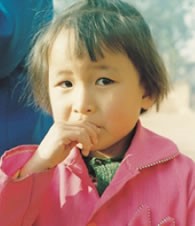Palyu in China

Photo Source:
Copyrighted © 2026
Operation China, Asia Harvest All rights reserved. Used with permission |
Send Joshua Project a map of this people group.
|
| People Name: | Palyu |
| Country: | China |
| 10/40 Window: | Yes |
| Population: | 16,000 |
| World Population: | 16,000 |
| Primary Language: | Bolyu |
| Primary Religion: | Ethnic Religions |
| Christian Adherents: | 6.30 % |
| Evangelicals: | 0.50 % |
| Scripture: | Unspecified |
| Ministry Resources: | No |
| Jesus Film: | No |
| Audio Recordings: | No |
| People Cluster: | Mon-Khmer |
| Affinity Bloc: | Southeast Asian Peoples |
| Progress Level: |
|
Introduction / History
The Palyu have not been included under any nationality in China. They were included in a generic list of Undetermined Minorities in the Chinese census. Palyu is this group's self-name. The Chinese and neighboring peoples call them Lai.
According to Paul Benedict, the traditional homeland of the Palyu was in southwest Guizhou and southern Yunnan provinces, where the Palyu have assimilated to the cultures and languages of Yi groups.
What Are Their Lives Like?
The Palyu are proud of their ethnic identity and are eager to preserve their culture. Their language is gradually fading out and the people are fast being assimilated into the Han Chinese culture.
A Palyu home is made of wood and consists of two stories. The lower area is for animals, while the upper level is where the family sleeps.
What Are Their Beliefs?
The Palyu have never been exposed to Buddhism, which many of the Mon-Khmer groups in western Yunnan have embraced. Instead, they practice animism and ancestor worship, and are careful not to offend the spirits they believe protect their communities.
Western Guangxi is one of the most gospel-neglected areas in all of China. There are a few believers in the region, but none known among the Palyu. In 1922, Rev. W. H. Oldfield, wrote an appeal for missionaries to reach the Palyu and other tribes in their region. Today, there are some Palyu believers, but no movement to Christ as yet.
What Are Their Needs?
The Palyu people need to submit to Jesus Christ so they can experience the abundant life he offers them in John 10:10.
Prayer Points
Pray for the spiritual blindness and bondage to the evil one to be removed so they can understand and respond to Christ.
Pray for the Lord to provide for their physical and spiritual needs as a testimony of his power and love.
Pray that the Palyu people will have a spiritual hunger that will open their hearts to the King of kings.
Pray for an unstoppable movement to Christ among them.